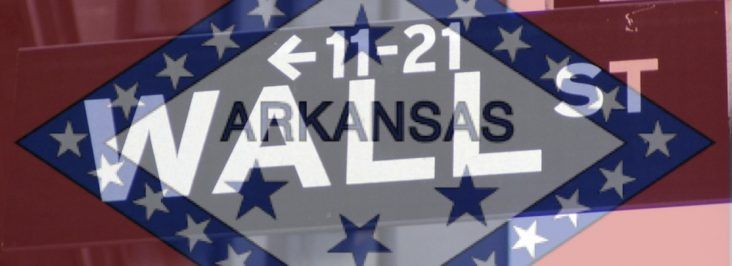Arkansas stocks lose ground following Brexit vote, stave off major sell-offs
by June 24, 2016 3:25 pm 167 views

Although Arkansas stocks emerged bruised and battered from Friday’s frantic business day after the United Kingdom’s referendum to exit membership in the European Union, most state concerns were able to stave off major sell-offs that roiled international markets from London to Tokyo and Wall Street.
Still, at the end of Friday’s trading session, the immediate shock of the so-called Brexit decision on the financial markets was pretty apparent. According to Reuters, global stock markets lost about $2 trillion in value after Friday’s historic vote to leave the EU, while the sterling suffered a record one-day plunge to a 31-year low and money poured into safe-haven gold and government bonds.
Stocks also tumbled in Europe with stock market exchanges in Frankfurt and Paris each falling 7% to 8%. The Italian and Spanish markets posted their sharpest one-day drops ever, falling more than 12% led by a dive in European bank stocks. Italy’s Unicredit fell 24%, while Spain’s Banco Santander fell 20%.
In the U.S., stocks on Wall Street traded down most of the day as the Dow Jones Industrial Average lost most of its year-to-date gains, declining 611.21 points, or 3.4%, to 17399.86. The S&P 500 index fell 3.6%, dragged lower by bank stocks, and the tech-heavy Nasdaq Composite shed 4.1% as the news of the Brexit vote filtered into America equities.
On the New York Mercantile Exchange, international crude oil prices also recovered some of the losses from Friday’s earlier session after the EU exit vote precipitated a mass selloff across all markets. West Texas Intermediate, the U.S. premium benchmark crude, settled down $2.47, or 4.9%. at $47.64 a barrel. Brent crude prices on London’s ICE Futures recovered to close at $48.41, down $2.50 or 4.9%.
TYSON, WAL-MART HOLD UP, ARKANSAS BANKS HAVE TOUGH DAY
Meanwhile, Arkansas’ stocks were down nearly across the board with only Tyson Foods able to eke gains in the week-ending session that eroded billions of dollars of market value in U.S. companies. Also, Wal-Mart Stores, which owns the Asda supermarket chain in Great Britain, was able to recover earlier losses to close the day at $71.96, down only 14 cents.
Arkansas banks were the biggest losers with Bank of the Ozarks, Home Bancshares, Simmons First National and Bear State Financial all declining between 7% and 9% in Friday’s session. Murphy Oil Corp. also got caught in the week-ending downdraft, closing down $1.90 or 5.9% at $30.51.
Despite those losses, none of the Arkansas publicly traded concerns saw double-digit losses in stock value, although some analysts expect next week’s session on Wall Street to paint a clearer picture of how U.S. stocks will hold up as the United Kingdom decides on how to move forward.
In the midst of the U.K.’s divorce from the European Union that is expected to take more than two years for negotiations, concerns about the fallout to the U.S. economy, stock market and financial institutions ranged from the catastrophic fear of a possible run on U.S. banks to views that today’s vote is only a temporary market shock.
According to Hal Scott, professor of international financial systems at Harvard Law School and director of the Committee on Capital Markets Regulation, “the global spillover effects could be compounded by the fact that the Federal Reserve, the FDIC, and Treasury Department are highly limited in their ability to respond due to Dodd-Frank restrictions on their lending authority to non-banks and ability to guarantee debt.”
Scott, in a statement on Friday, said the Federal Reserve and other central banks around the world are charged with serving as a lender of last resort (LLR). When there is a panic, large financial institutions must borrow from these central banks or else they will fail. “The U.S. government would not be able to do much to prevent a liquidity crisis,” said Scott. “The European Central Bank and the Bank of England have far more authority to respond to a panic than the U.S. government.”
The Harvard economist added that today’s vote exposes a major flaw in banking regulation, which focuses on the risk of interconnectedness among banks “instead of contagion.” Ultimately, he said the financial system may not be prepared to handle the potential fallout from Britain voting to exit the European Union.
“This is because the Brexit could cause a run on the banks and other financial institutions. As this political upheaval instigates fear in investors, they may pull their money out of the short-term debt market. This could lead to fire-sales of assets and a liquidity crisis,” Scott said. “The potential from Brexit isn’t due to bad investments or moral hazard by banks or other financial institutions. We are talking about a classic panic.”
However, European credit underwriter Atradius cautioned that although the Brexit decision has broad implications on financial markets, in practical terms few things will change in the immediate future. Alun Sweeney, commercial head of Atradius’ U.K. and Ireland operations, said there will be a period of instability but anticipates most EU members and other countries will see little impact.
“There will be no short term impact on our underwriting stance for the UK market. When the emotion of the result subsides, it is important to recognize that UK business will adapt and those with strong management, executing a clear and well-funded strategy, will continue to thrive,” Sweeney said. “The UK continues to be open for business and so do we.”
